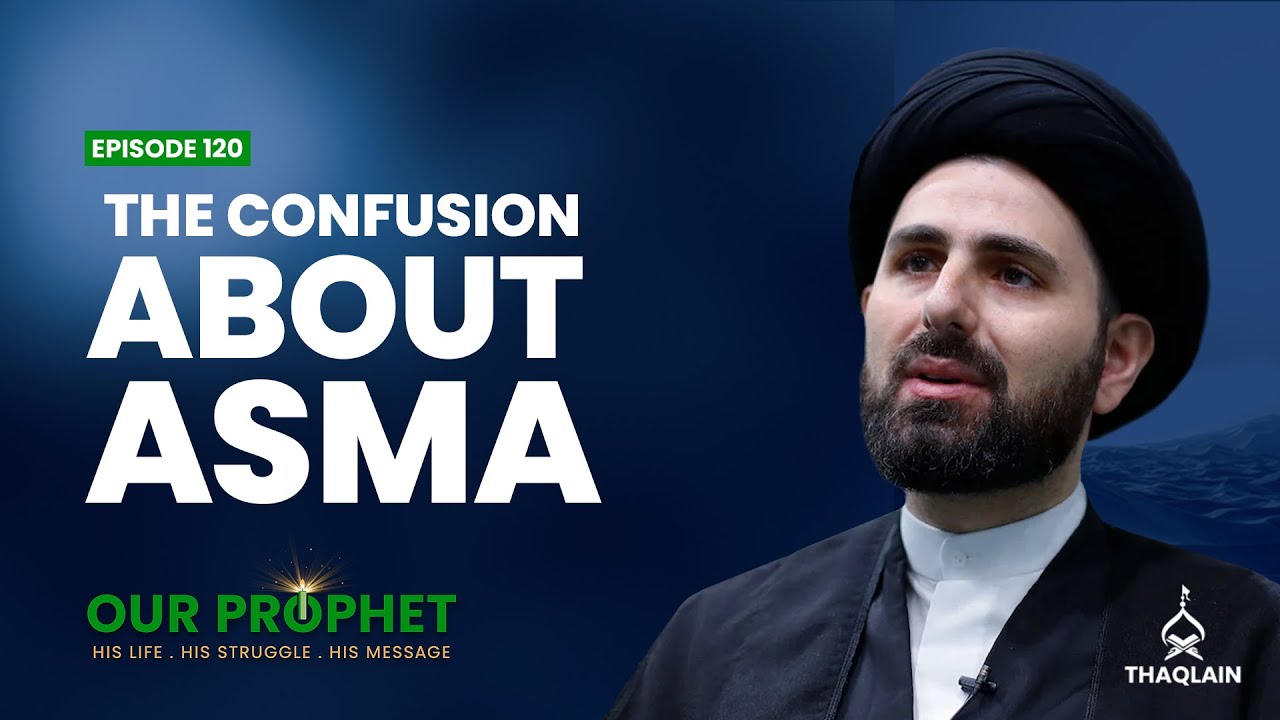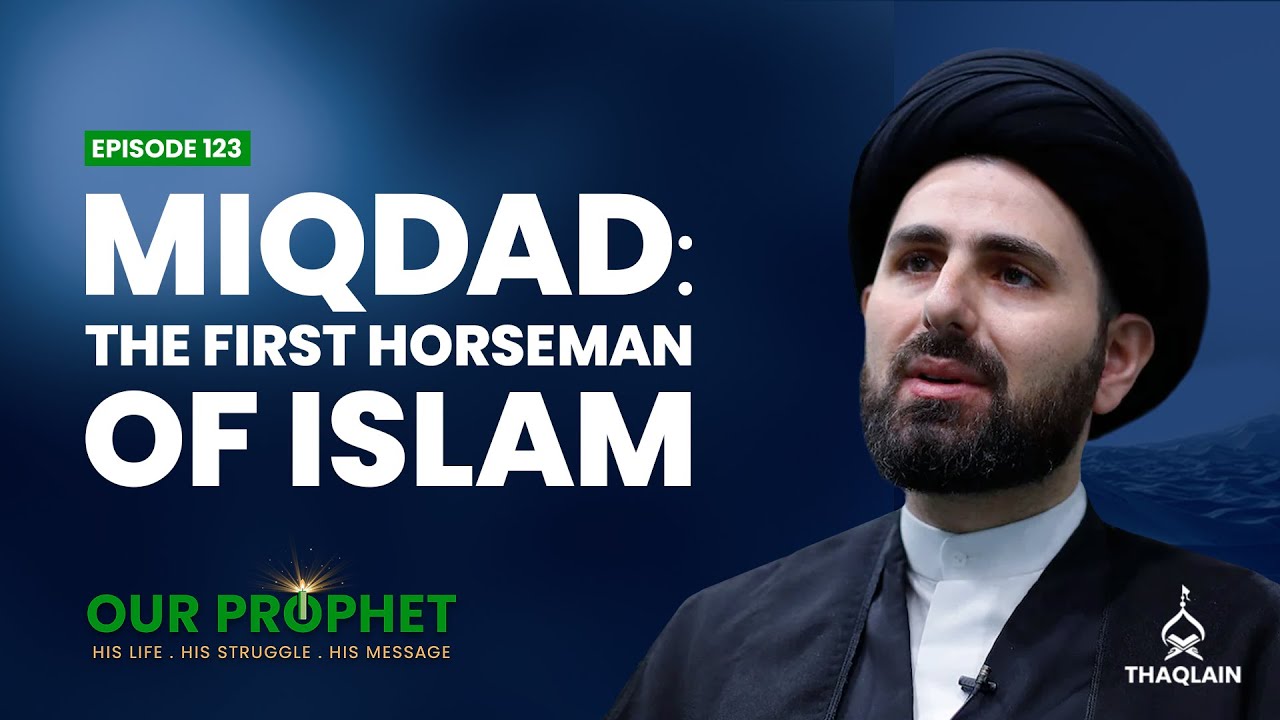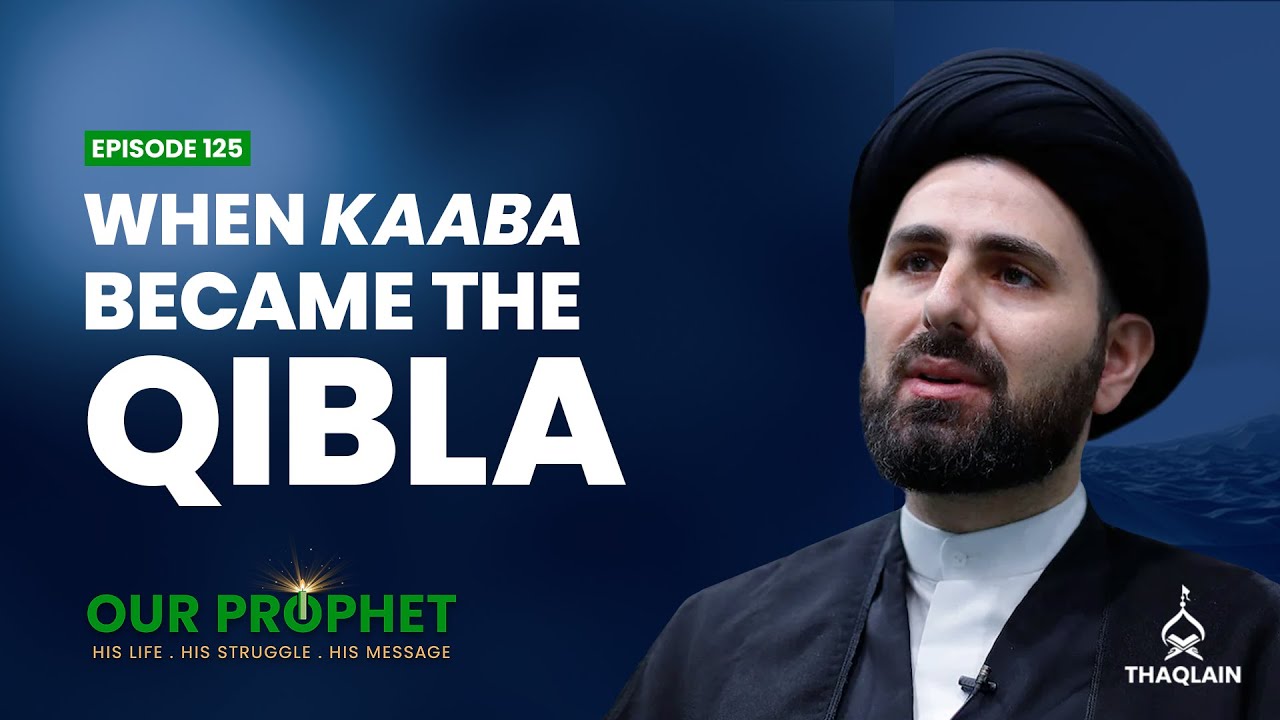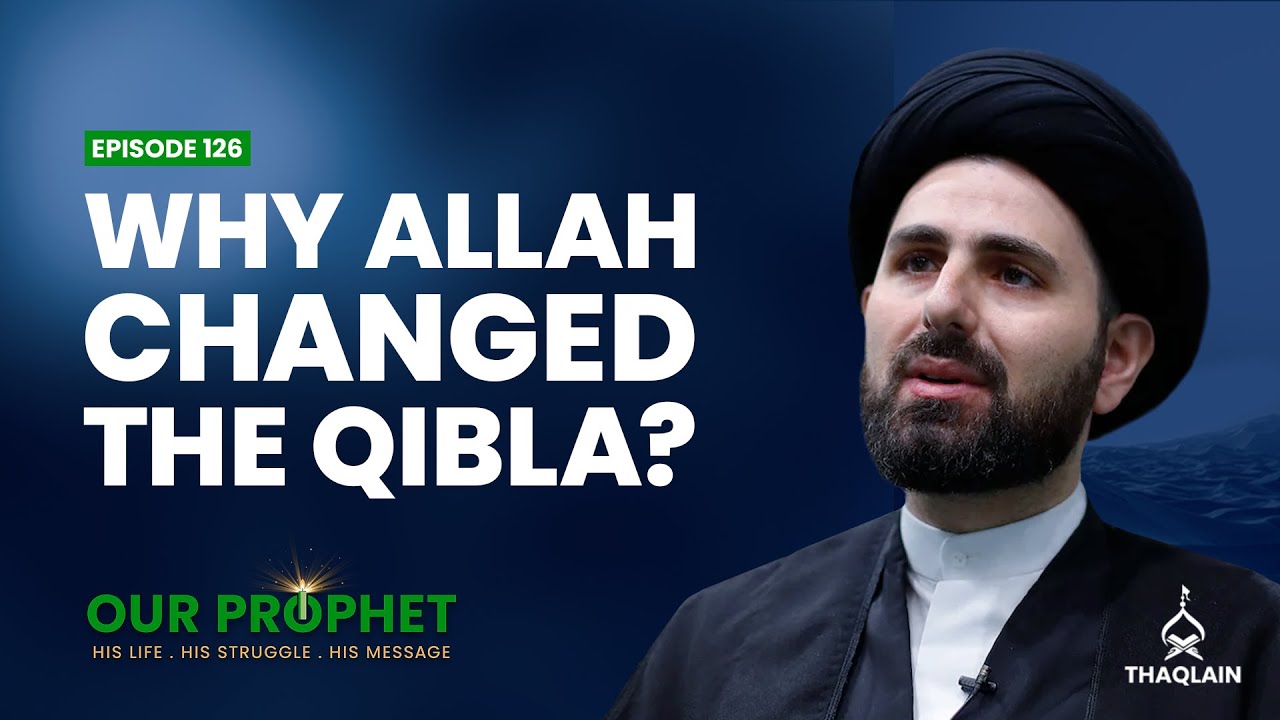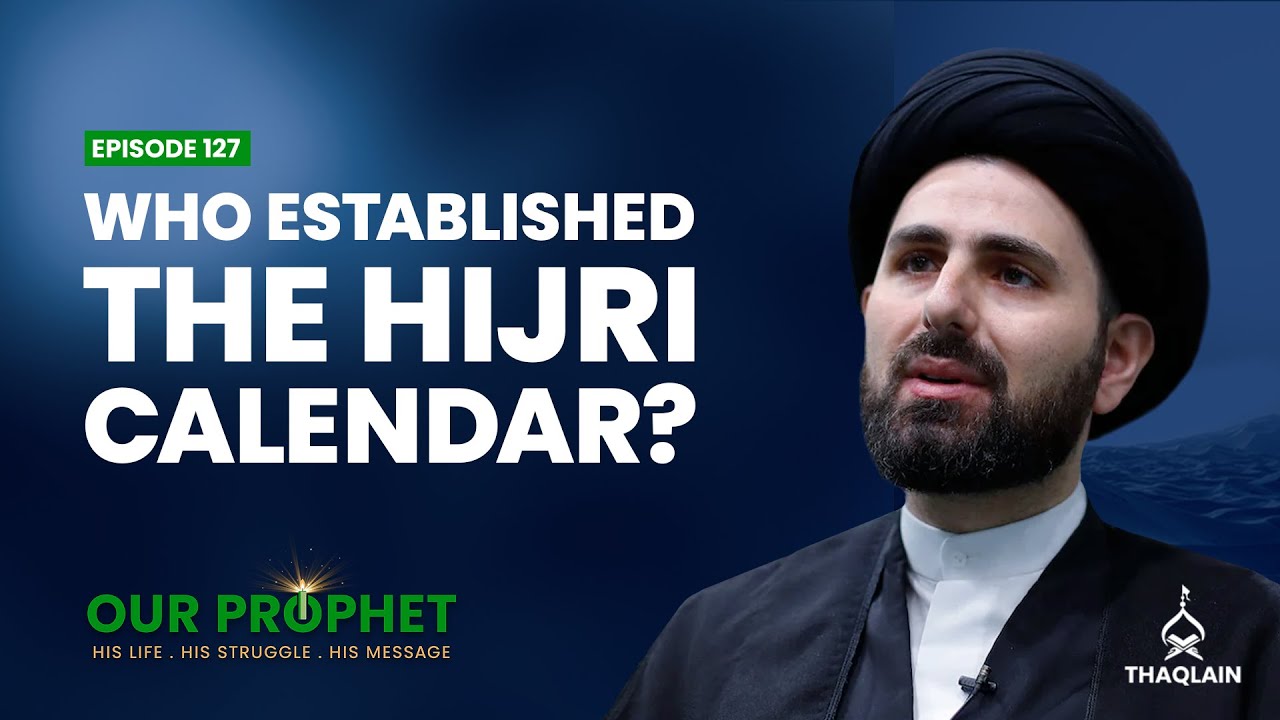Why "Ash-hadu Anna Aliyun Wali Ullah" Was Added to the Adhan? - Our Prophet 6 - 109/127
That is a very important discussion about this phrase: "Ash-hadu anna 'Aliyyan waliyyu Allah" [I bear testimony that 'Ali is the wali of Allah]. Now, this discussion in itself is very detailed, so I will just briefly summarize it.
The majority of our scholars believe that "Ash-hadu anna 'Aliyyan waliyy Allah" is not an original Wajib mandatory part of the Adhan because every ritual has mandatory parts and it has recommended parts like Salah. Salah has mandatory parts; Ruku [genuflection], Sujud [prostration], qira'ah [recitaton], Hamd [chapter of Hamd], Surah [chapter of Qur'an]. Then it has also Mustahab parts; like the Qunut [supplication] is Mustahab. The Dhikr that you say in the last Sujud- 'Ya Waliyya al-'Aafiyah'- that is Mustahab. A lot of the Tasbihat [glorifications] they are Mustahab.
The Adhan in its original form does not have "Ash-hadu anna 'Aliyyan waliyy Allah"as a Wajib part. It is a recommended, Mustahab part. Because, we have many narrations which state whenever the name of the Prophet, salla Allahu 'alayhi wa alihi, is mentioned, the name of Imam 'Ali Ibn Abi Talib 'alayhi as-salam, is also mentioned after that as a recommended deed.
So, many scholars, many Maraji' [scholars], they say when you say "Ash-hadu anna 'Aliyyan waliyy Allah", do not state it with the Niyyah [intention] of Juzi'yyah [essential part of greater whole], that this is a Wajib part of the Adhan. Say it with the Niyyah of Istihbab [recommendation]. Many, many scholars have said that. There are some Maraji' today who say no say it with the Niyyah of Juz'iyyah. But historically, most Maraji' have said do not say it with the Niyyah of Juz'iyyah.
And remember, you can add anything to the Adhan with this intention. Haven't you heard the Muadh-dhin [caller to prayer] say, for example; 'Allahu Akbar, Allah u Akbar.' [Allah is greater] And then he would comment by saying 'Jalla Jalaluhu' [His Majesty is majestical]. Have you not heard that? Even Sunnis do that! Well, hey, you are adding something to the Adhan. That is fine, you are not adding it with the Niyyah that this is part of the Adhan. You are adding it with the Niyyah that when the name of Allah is mentioned, it is Mustahab to praise God. So, I am praising God.
So, when the name of the Prophet salla Allahu 'alayhi wa alihi is mentioned, it is also Mustahab to mention Imam 'Ali Ibn Abi Talib 'alayhi as-salam. Many scholars have said you make it with this Niyyah. But still, there are still scholars, some Maraji' today who believe, no, it is part of Adhan.
After the event of Ghadir, when the Prophet salla Allahu 'alayhi wa alihi, was in Madinah, the last year he went to the Hajj after the event of Ghadir. When Imam Ali 'alayhi as-salam, was declared as the 'Wali'-as the authority for the Muslims. It was then when "Ash-hadu anna 'Aliyyan waliyy Allah" was revealed and the Prophet, salla Allahu 'alayhi wa alihi commanded the Muadh-dhin to say that.
Or one version says he said it, the Prophet approved of it, and that is when it became part of the Adhan. But of course, those who came after the Prophet, they omitted that from the Adhan. So, that is the case with "Ash-hadu anna 'Aliyyan waliyy Allah".
Now, when Jibrail said it in the Heavens in Bayt al-Ma'mur. Did he say "Ash-hadu anna 'Aliyyan waliyy Allah" or not? We do not know what exactly he said because not every aspect of the Adhan was clearly defined in those Ahadith [narrations]. It is highly likely that he did say it. There are clues that indicate he did say but we do not have like a Sahih Hadith that can verify that.
So, that is a discussion on "Ash-hadu anna 'Aliyyan waliyy Allah", very briefly, by the way, this is a very elaborate discussion but I tried to summarize it.
And then there are other aspects of the Adhan. "As-salat al-khayrun min an-nawm" [The prayer is better than sleep]. We have evidence that this did not exist at the time of the Prophet. This did not exist at the time of Abu Bakr. At the time of 'Umar Ibn al-Khattab, basically, he would come and to the Masjid, sometimes he would see people sleeping and then he told them the Muadh-dhin, when you are making the call to prayer, the Fajr prayer, by the way. They do not say this in all the Adhan, it is only for the Fajr prayer, because that is when people are sleeping, tell the people, tell them "As-salat al-khayrun min an-nawm"- prayer is better than sleeping.
Just examine this phrase from a linguistic perspective, just from the basic meaning of it. You know, it does not fit within the Adhan because the meaning is so silly. You are telling believers, hey, prayer is better than sleeping. Oh, really? I thought sleeping is better than praying... It is a silly statement to begin with.
Think about it, just think about it. You are saying to people, come pray. Prayer is definitely better than sleeping. Does anybody have a doubt about that? You can tell it does not fit with the other segments of the Adhan. So, we do actually have evidence, proof that it was 'Umar Ibn al-Khattab who inserted that in the Adhan.
And "Hayya 'ala khayr al-'Amal" [Hasten to the best of deeds]. We have also evidence from Sunni sources that it existed at the time of the Prophet. Also, 'Umar Ibn al-Khattab is the one who omitted it.
Because "Hayya 'ala Khayr al- 'Amal" means come to the best of deeds. 'Umar was mobilizing armies to go and fight for the conquests. And he would advocate that the best deed is what? Jihad! Fighting. So, he did not want people to think prayer is better. So maybe they would stay and not go to Jihad, thinking that I am doing the best of deeds, so no need for Jihad. So, he omitted that from the Adhan to mobilize people and encourage them to go to the Jihad. We actually have historical evidence for that.
So, the original Adhan that was revealed did not have "As-salatu khayrun min al-nawm" and it had "Hayya 'ala khayr al-'Amal". This is something we can prove with evidence from Sunni books and Shi'ah books.
Yes, say. [Going back to "Ash-hadu anna 'Aliyyan waliyy Allah", if it is not Wajib, the whole Adhan, we all are and we keep saying "Ash-hadu anna 'Aliyyan waliyy Allah", it is not Wajib, but the whole Adhan is not Wajib. So, what is left?] Yes. See, in Islamic law, whenever you have a recommended act like the Adhan, it has necessary components. What do we mean by necessary components? That means if you want to observe this Mustahab act and fulfil the command of offering it, you have to go by these parts.
Let me give you an example. Salat al-Layl or Salat un-Nafilah, is it Mustahab or Wajib? So, can I do it three Rak'at? [No!] Why not? It is Mustahab to begin with. So, you could say the Ruku' in Salat al-Layl is necessary. But what do you mean by necessary?
That means for Salat al-Layl to be valid, it must have a Ruku', Sujud and only two Rak'at. Two, two, .. the last one is one. But the whole Salat to begin with, what is it? It is Mustahab. But it has necessary components. That means you have to observe these components for the act to be valid. You can not just add or subtract something. But the Qunut in Salat al-Layl, it is a Mustahab part in a Mustahab act. The Ruku' is a necessary part in a Mustahab act. You see that difference?
Same with "Ash-hadu anna 'Aliyyan waliyy Allah" according to many scholars. It is a Mustahab part in a Mustahab act. "Ash-hadu anna Muhammadan Rasul Allah" is a necessary part in a Mustahab act. In other words, these scholars say if you do not say "Ash-hadu anna Muhammadan Rasul Allah", the whole Adhan is Batil - it is invalid.
It is like praying Salat an-Nafilah one Rak'at! It is invalid. But if you do not say "Ash-hadu anna 'Aliyyan waliyy Allah", the Adhan itself is valid because you have not skipped a necessary component.
Yes, and we examined this last year in Islamic law scholars, many of them today state historically, because Imam 'Ali, 'alayhi as-salam, has been marginalized and sidelined, and his virtues denied. The belief in the Wilayah has become basically the slogan for our Madh-hab [school of thought]. That is our way of defending Imam 'Ali Ibn Abi Talib 'alayhi as-salam, and the Wilayah of Imam 'Ali.
That is why many of the scholars, they believe that you should observe "Ash-hadu anna 'Aliyyan waliyy Allah" and if you do not, it is as if you are siding with those who are rejecting the authority of Imam 'Ali Ibn Abi Talib 'alayhi as-salam.
So, they call this 'Unwan Thanawi'- It is a secondary ruling. The primary ruling is that it is not Wajib for you to observe it in the Adhan, but the secondary ruling, due to this historical circumstances of Imam 'Ali, 'alayhi as-salam being marginalized. Then we have to make a statement by defending the Imam. So, from that aspect, some of them will even consider it Wajib.
Das ist eine sehr wichtige Diskussion über diesen Satz: "Ash-hadu anna 'Aliyyan waliyyu Allah" [Ich bezeuge, dass 'Ali der Wali Allahs ist]. Nun, diese Diskussion ist an sich sehr detailliert, so dass ich sie nur kurz zusammenfassen werde.
Die Mehrheit unserer Gelehrten ist der Meinung, dass "Ash-hadu anna 'Aliyyan waliyy Allah" kein ursprünglicher Wajib Pflichtteil des Adhan ist, weil jedes Ritual Pflichtteile und empfohlene Teile hat, wie der Salah. Der Salah hat obligatorische Teile: Ruku' [Kniebeugung], Sujud [Niederwerfung], Qira'ah [Rezitation], Hamd [Surah des Hamd], Surah [Ein Kapitel im Qur'an]. Dann hat es auch Mustahab-Teile; so wie das Qunut [Bittgebet] Mustahab ist. Das Dhikr, das man im letzten Sujud sagt - 'Ya Waliyya al-'Aafiyah'- ist Mustahab. Viele der Tasbihat [Verherrlichungen] sind Mustahab.
Der Adhan in seiner ursprünglichen Form hat nicht "Ash-hadu anna 'Aliyyan waliyy Allah" als ein Wajib-Teil. Es ist ein empfohlener Mustahab-Teil. Denn es gibt viele Überlieferungen, die besagen, dass jedes Mal, wenn der Name des Propheten, salla Allahu 'alayhi wa alihi, erwähnt wird, auch der Name von Imam 'Ali Ibn Abi Talib 'alayhi as-salam, als empfohlene Handlung danach erwähnt wird.
So sagen viele Gelehrte, viele Maraja' [Gelehrte], wenn du "Ash-hadu anna 'Aliyyan waliyy Allah" sagst, dann sage es nicht mit der Niyyah [Absicht] von Juzi'yyah [wesentlicher Teil eines größeren Ganzen], dass dies ein Wajib-Teil des Adhan ist, sage es mit der Niyyah von Istihbab [Empfehlung]. Viele, viele Gelehrte haben das gesagt. Es gibt heute einige Maraji', die sagen, dass man es nicht mit der Niyyah der Juz'iyyah sagen soll. Aber historisch gesehen haben die meisten Maraji' gesagt, dass sie es nicht mit der Niyyah der Juz'iyyah sagen.
Und denken Sie daran, dass Sie dem Adhan mit dieser Absicht alles hinzufügen können. Hast du nicht gehört, wie der Muadh-dhin [Gebetsrufer] zum Beispiel sagt: "Allahu Akbar, Allah u Akbar". [Und dann kommentiert er das mit "Jalla Jalaluhu" [Seine Majestät ist majestätisch]. Habt ihr das nicht gehört? Sogar Sunniten tun das! Nun, hey, du fügst dem Adhan etwas hinzu. Das ist in Ordnung, du fügst es nicht mit der Niyyah hinzu, dass dies Teil des Adhan ist. Du fügst es mit der Niyyah hinzu, dass es Mustahab ist, Gott zu preisen, wenn der Name Allahs erwähnt wird. Also, preise ich Gott.
Wenn also der Name des Propheten salla Allahu 'alayhi wa alihi erwähnt wird, ist es auch Mustahab, Imam 'Ali Ibn Abi Talib 'alayhi as-salam zu erwähnen. Viele Gelehrte haben gesagt, dass man es mit dieser Niyyah macht. Aber es gibt immer noch Gelehrte, einige Maraji' heute, die glauben, nein, es ist Teil des Adhan.
Nach dem Ereignis von Ghadir, als der Prophet, salla Allahu 'alayhi wa alihi, in Madinah war, ging er im letzten Jahr nach dem Ereignis von Ghadir zur Hadsch, als Imam Ali, Friede sei mit ihm, zum "Wali", zur Autorität für die Muslime, erklärt wurde. Es war zu der Zeit, als "Ash-hadu anna 'Aliyyan waliyy Allah" offenbart wurde und der Prophet, salla Allahu 'alayhi wa alihi, den Muadh-dhin befahl, dies zu sagen.
Oder eine Version besagt, er habe es gesagt, der Prophet habe es gebilligt, und dann sei es Teil des Adhan geworden. Aber natürlich haben dies diejenigen, die nach dem Propheten kamen, aus dem Adhan weggelassen. Das ist also der Fall bei "Ash-hadu anna 'Aliyyan waliyy Allah".
Nun, als Jibrail es im Himmel in Bayt al-Ma'mur sagte, sagte er "Ash-hadu anna 'Aliyyan waliyy Allah" oder nicht? Wir wissen nicht, was er genau gesagt hat, da nicht jeder Aspekt des Adhan in diesen Ahadith [Überlieferungen] klar definiert wurde. Es ist sehr wahrscheinlich, dass er es gesagt hat. Es gibt Anhaltspunkte, die darauf hindeuten, dass er es gesagt hat, aber wir haben keinen Sahih Hadith, der das bestätigen kann.
Das ist also eine Diskussion über "Ash-hadu anna 'Aliyyan waliyy Allah", nur kurzgefasst übrigens. Das ist eine sehr ausführliche Diskussion, aber ich habe versucht, sie zusammenzufassen.
Und dann gibt es noch andere Aspekte des Adhan. "As-salat al-khayrun min an-nawm" [Das Gebet ist besser als der Schlaf]. Wir haben Beweise dafür, dass es dies zur Zeit des Propheten nicht gab. Es gab sie nicht zur Zeit von Abu Bakr. Zur Zeit von 'Umar Ibn al-Khattab kam dieser in die Masjid und sah manchmal Leute schlafen, und dann sagte er dem Muadh-dhin, wenn du den Gebetsruf macht, das Fajr-Gebet, übrigens (Sie sagen das nicht beim gesamten Adhan, sondern nur beim Fajr-Gebet, denn dann schlafen die Leute) und er sagt Ihm, sag den Leuten: "As-salat al-khayrun min an-nawm" - das Gebet ist besser als der Schlaf.
Untersuch mal diesen Satz einfach nur von seiner grundlegenden Bedeutung heraus einer linguistischen Perspektive. Weißt man er passt nicht in den Adhan, weil die Bedeutung so dumm ist. Sie sagen den Gläubigen, hey, beten ist besser als schlafen. Ach, wirklich? Ich dachte, schlafen ist besser als beten Das ist eine dumme Aussage, um damit zu beginnen.
Denken Sie darüber nach, denken Sie einfach darüber nach. Sie sagen zu den Menschen: Kommt beten. Beten ist definitiv besser als Schlafen. Hat irgendjemand daran einen Zweifel? Sie können sehen, dass es nicht zu den anderen Abschnitten des Adhan passt. Wir haben also tatsächlich Beweise, Beweise dafür, dass es 'Umar Ibn al-Khattab war, der dies in den Adhan einfügte.
Und "Hayya 'ala khayr al-'Amal" [Eile zu den besten Taten]. Wir haben auch Beweise aus sunnitischen Quellen, dass es zur Zeit des Propheten existierte. Außerdem ist 'Umar Ibn al-Khattab derjenige, der es ausgelassen hat.
Denn "Hayya 'ala Khayr al- 'Amal" bedeutet: "Komm zu den besten Taten". 'Umar mobilisierte Armeen, um für die Eroberungen zu kämpfen. Und was ist die beste Tat, für die er eintrat? Dschihad! Kämpfen. Er wollte also nicht, dass die Menschen glauben, das Gebet sei besser. So würden sie vielleicht bleiben und nicht in den Dschihad gehen, weil sie denken: Ich tue die besten Taten, also brauche ich keinen Dschihad. Also hat er das im Adhan weggelassen, um die Menschen zu mobilisieren und sie zu ermutigen, in den Dschihad zu ziehen. Dafür gibt es tatsächlich historische Beweise.
Der ursprüngliche Adhan, der offenbart wurde, hatte also nicht "As-salatu khayrun min al-nawm", sondern "Hayya 'ala khayr al-'Amal". Dies ist etwas, das wir mit Beweisen belegen können, sowohl aus sunnitischen als auch schiitischen Büchern.
Ja Sayyid? [Zurück zu "Ash-hadu anna 'Aliyyan waliyy Allah", wenn es nicht Wajib ist, der ganze Adhan, sind wir alle und wir sagen immer wieder "Ash-hadu anna 'Aliyyan waliyy Allah", es ist nicht Wajib, aber der ganze Adhan ist nicht Wajib. Was bleibt also übrig?] Ja. Sehen Sie, im islamischen Recht hat jede empfohlene Handlung, wie der Adhan, notwendige Bestandteile. Was meinen wir mit notwendigen Bestandteilen? Das bedeutet, dass man diese Teile befolgen muss, wenn man diese Mustahab-Handlung befolgen und das Gebot erfüllen will, sie zu verrichten.
Ich möchte Ihnen ein Beispiel geben. Salat al-Layl oder Salat un-Nafilah, ist es Mustahab oder Wajib? Kann ich es also drei Rak'at verrichten? [Nein!] Warum nicht? Es ist Mustahab, um damit zu beginnen. Du könntest also sagen, dass der Ruku' im Salat al-Layl notwendig ist. Aber was ist mit notwendig gemeint?
Das bedeutet, damit das Salat al-Layl gültig ist, muss es ein Ruku', Sujud und nur zwei Rak'at haben. Zwei, zwei, das letzte ist eins. Aber der ganze Salat zu Beginn, was ist er? Es ist Mustahab. Aber er hat notwendige Bestandteile. Das bedeutet, dass man diese Komponenten einhalten muss, damit die Handlung gültig ist. Man kann nicht einfach etwas hinzufügen oder weglassen. Aber die Qunut im Salat al-Layl ist ein Mustahab-Teil in einer Mustahab-Handlung. Der Ruku' ist ein notwendiger Teil einer Mustahab-Handlung. Sehen sie diesen Unterschied?
Dasselbe gilt für "Ash-hadu anna 'Aliyyan waliyy Allah" nach Ansicht vieler Gelehrter. Es ist ein Mustahab-Teil in einer Mustahab-Handlung. "Asch-hadu anna Muhammadan Rasul Allah" ist ein notwendiger Teil einer Mustahab-Handlung. Mit anderen Worten, diese Gelehrten sagen, wenn man nicht "Asch-hadu anna Muhammadan Rasul Allah" sagt, ist der gesamte Adhan Batil - er ist ungültig.
Es ist wie das Beten des Salat an-Nafilah um ein Rak'at! Es ist ungültig. Aber wenn du nicht "Ash-hadu anna 'Aliyyan waliyy Allah" sagst, ist der Adhan selbst gültig, weil du keine notwendige Komponente ausgelassen hast.
Ja, und das haben wir letztes Jahr bei den islamischen Rechtsgelehrten untersucht, von denen viele heute behaupten, dass sie Imam 'Ali, 'alayhi as-salam, historisch gesehen an den Rand gedrängt, ins Abseits gestellt und seine Tugenden geleugnet haben. Der Glaube an die Wilayah ist im Grunde zum Slogan unserer Madh-hab [Denkschule] geworden. Das ist unsere Art, Imam 'Ali Ibn Abi Talib 'alayhi as-salam und die Wilayah von Imam 'Ali zu verteidigen.
Deshalb sind viele der Gelehrten der Meinung, dass man "Ash-hadu anna 'Aliyyan waliyy Allah" befolgen sollte und wenn man dies nicht tut, ist es so, als würde man sich auf die Seite derjenigen stellen, die die Autorität von Imam 'Ali Ibn Abi Talib 'alayhi as-salam ablehnen.
Daher nennen sie dies 'Unwan Thanawi' - es ist eine sekundäre Regelung. Die primäre Regelung ist, dass es nicht Wajib ist, dies im Adhan zu beachten, aber die sekundäre Regelung, aufgrund der historischen Umstände, dass Imam 'Ali, 'alayhi as-salam, marginalisiert wurde. Dann müssen wir eine Erklärung abgeben, indem wir den Imam verteidigen. Unter diesem Aspekt werden einige von ihnen es sogar als Wajib betrachten.
Esta é uma discussão muito importante sobre esta frase: "Ash-hadu anna 'Aliyyan waliyyu Allah" [“Testemunho que 'Ali é o Wali de Allah”]. Agora, esta discussão em si é muito detalhada, por isso, vou apenas resumi-la brevemente.
A maioria dos nossos estudiosos acredita que "Ash-hadu anna 'Aliyyan waliyyu Allah" não é uma parte wajib [obrigatória] original do adhan [chamamento oral que antecede as cinco orações obrigatórias], porque cada ritual tem partes obrigatórias e partes recomendadas, como o Salat tem. O Salat tem partes obrigatórias; Ruku [genuflexão], Sujood [prostração], Qira'ah [recitação], Surat al-Hamd [primeira surata, ou capítulo, do Alcorão Sagrado]. Há também partes que são mustahab [“recomendadas”], como o Qunoot [súplica feita durante o salat] é mustahab. O Dhikr que se diz no último sujood — 'Ya Waliyya al-'Aafiyah' — isto é Mustahab. Muitos dos Tasbihat [sequências de frases que glorificam a Allah] são Mustahab.
O Adhan na sua forma original não tem "Ash-hadu anna 'Aliyyan waliyy Allah'" como parte wajib. É uma parte recomendada, mustahab, porque temos muitas narrações que afirmam que, sempre que o nome do Profeta (Salla’Allahu ‘alayhi wa-alihi) [“Que bênçãos de Deus esteja sobre ele e sua família”] é mencionado, o nome do Imam 'Ali Ibn Abi Talib ('alayhi as-salam) [“Que a Paz esteja com ele”] é também mencionado depois disso, como uma ação recomendada.
Então, muitos estudiosos, muitos maraji' [estudiosos da Lei islâmica com autoridade para emitir decisões jurídicas baseadas em interpretação da citada Lei], dizem que, quando se diz "Ash-hadu anna 'Aliyyan waliyyu Allah', não o declarem com a Niyyah de Juzi'yyah [intenção de realizar uma parte fundamental de um todo maior], porque esta é uma parte recomendada, porém não obrigatória, do adhan. Diga-o com a Nyyah de Istihbab [intenção de fazer algo recomendado, porém não obrigatório]. Muitos, muitos estudiosos já o disseram. Há, hoje, alguns maraji’ que orientam “digam com a Niyyah de Juz'iyyah”, porém, historicamente, a maioria dos maraji’ disseram "não o digam com a Niyyah de Juz'iyyyah".
E, lembrem-se, podem acrescentar qualquer coisa ao Adhan com esta intenção. Não ouviu o Muadh-dhin [chamador à oração] dizer, por exemplo, 'Allahu Akbar, Allahu Akbar' [“Allah é Maior”] e, então, dizer ”Jalla Jalaluhu” [”Sua Majestade é majestosa”]. Não ouviu isto? Até os sunitas fazem isso! Bem, ei, está a acrescentar algo ao Adhan. Tudo bem, não está a acrescentar com a noção de que isso faz parte do adhan. Está a acrescentar com a noção de que, quando o nome de Allah é mencionado, é mustahab louvar a Deus. Por isso, estou a louvar a Deus.
Assim, quando o nome do Profeta (Salla’Allahu ‘alayhi wa-alihi) é mencionado, é também mustahab mencionar o Imam 'Ali Ibn Abi Talib ('alayhi as-salam). Muitos estudiosos disseram que se faz com esta intenção. No entanto, mesmo assim, há estudiosos, alguns Maraji' hoje em dia que acreditam ”não, isso faz parte do adhan”.
Após o evento de Ghadir, quando o Profeta (Salla’Allahu ‘alayhi wa-alihi), esteve em Medina, no último ano em que ele foi ao Hajj… [isso foi] após o evento de Ghadir. Quando o Imam Ali ('alayhi as-salam) foi declarado como o 'Wali' — como a autoridade para os muçulmanos. Foi, então, quando "Ash-hadu anna 'Aliyyan waliyy Allah" foi revelado, e o Profeta, (Salla’Allahu ‘alayhi wa-alihi) ordenou ao Muadh-dhin que dissesse isso.
Ou uma versão diz que ele [o citado muadh-dhin responsável pelo adhan naquela ocasião] o disse, o Profeta aprovou, e foi quando se tornou parte do adhan. Porém, claro, aqueles que vieram depois do Profeta omitiram isso do adhan. Assim, é o caso de "Ash-hadu anna 'Aliyyan waliyy Allah'".
Agora, quando Jibra’il o disse nos Céus, em Bayt al-Ma'mur, ele disse "Ash-hadu anna 'Aliyyan waliyy Allah' ou não? Não sabemos exatamente o que ele disse, porque nem todos os aspectos do adhan foram claramente definidos naqueles ahadith [narrações]. É altamente possível que ele o tenha dito. Há pistas que indicam que ele disse, mas não temos um sahih hadith [narração comprovadamente autêntica] que possa verificar isso.
Portanto, esta é uma discussão sobre "Ash-hadu anna 'Aliyyan waliyy Allah", muito brevemente, a propósito… esta é uma discussão muito elaborada, mas eu tentei resumi-la.
Há também outros aspectos do adhan. "As-salat al-khayrun min an-nawm" [“A oração é melhor do que o sono”]. Temos provas de que isto não existia na época do Profeta. Isto não existia na época de Abu Bakr. Na época de 'Umar Ibn al-Khattab, basicamente, ele vinha à mesquita, por vezes, via pessoas a dormir e, então, disse ao muadh-dhin “quando tu fizeres o chamamento à oração” — a oração da Fajr [“Alvorada”], aliás; eles não fazem isso em todos os chamamentos, apenas na oração da Alvorada, porque é quando as pessoas estã quando dormindo — “diz ao povo, diz a eles ‘As-salat al-khayrun min an-nawm’”, ”a oração é melhor do que o sono”.
Basta examinar esta frase de uma perspectiva linguística, apenas a partir do seu significado básico. Não se enquadra dentro do adhan, porque o significado é bastante trivial.Você está dizendo aos crentes “ei, a oração é melhor que o sono.” ”Ah, verdade? Eu pensava que dormir é melhor do que rezar.” É uma afirmação trivial, para começar.
Pense nisso, apenas pense nisso. Você diz às pessoas “venham rezar. Rezar é definitivamente melhor do que dormir”. Alguém tem alguma dúvida sobre isso? Pode-se dizer que não se encaixa com os outros segmentos do adhan. Portanto, temos, efetivamente, provas, provas de que foi 'Umar Ibn al-Khattab que inseriu isso no adhan.
E "Hayya 'ala khayr al-'Amal" [“Apressai-vos à melhor das ações’]. Temos também provas de fontes sunitas de que ela existia na época do Profeta. Além disso, 'Umar Ibn al-Khattab foi quem o omitiu.
Porque "Hayya 'ala Khayr al-'Amal" significa “venha para a melhor das ações”. 'Umar estava a mobilizar exércitos para irem e lutarem pelas conquistas, e ele defendia que a melhor das ações era o quê? Jihad! A luta. Dessa maneira, ele não queria que as pessoas pensassem que a oração era melhor. Assim, talvez eles ficassem e não fossem ao jihad, pensando “estou a fazer o melhor dos feitos, então não há necessidade do jihad”. Então, omitiu isso do adhan, para mobilizar as pessoas e encorajá-las a ir ao jihad. Na verdade, temos provas históricas para isso.
Assim, o adhan original que foi revelado não tinha "As-salatu khayrun min al-nawm" e tinha "Hayya 'ala khayr al-'Amal". Isto é algo que podemos provar com provas de livros sunitas e livros xiitas.
[Espectador pede a palavra] Sim, diga. Voltando a "Ash-hadu anna 'Aliyyan waliyy Allah”. Se não é wajib todo o adhan, estamos todos… e continuamos a dizer "Ash-hadu anna 'Aliyyan waliyy Allah', não é wajib, mas o adhan inteiro não é wajib. Então, o que resta?
Sim. Veja, na lei islâmica, sempre que se tem um ato recomendado, como o adhan, este tem componentes necessários. O que entendemos por “componentes necessários”? Isto significa que, se quiser observar este ato mustahab e cumprir a ordem de oferecê-lo, tem de passar por estas partes.
Deixem-me dar um exemplo. Salat al-Layl ou Salat un-Nafilah [orações recomendadas, porém não obrigatórias] é mustahab ou wajib? Então, posso fazê-lo três rak'at [ciclos nos quais o salat se divide]? Por que não? É mustahab, para começar. Portanto, pode-se dizer que o ruku [forma singular de “rak'at”] no Salat al-Layl é necessário. No entanto, o que se quer dizer com "necessário"?
Isto significa que, para que Salat al-Layl seja válido, deve haver um ruku'… um sujos e apenas dois Rak'at. Dois, dois, o último é um. Porém, para começar, o salat em questão, como um todo, o que é? É mustahab, mas tem componentes necessários. Isso significa que é preciso observar estes componentes para que o ato seja válido. Não se pode simplesmente adicionar ou retirar algo. Entretanto, o qunoot em Salat al-Layl é uma parte mustahab em um ato mustahab. O ruku é uma parte necessária em um ato mustahab. Vê essa diferença?
O mesmo com "Ash-hadu anna 'Aliyyan waliyy Allah'", segundo muitos estudiosos. É uma parte mustahab em um ato mustahab. "Ash-hadu anna Muhammadan Rasul’Allah" [”Eu testemunho que Muhammad é Mensageiro de Allah”]é uma parte necessária num ato mustahab [o próprio adhan]. Em outras palavras, estes estudiosos dizem que, se não se disser "Ash-hadu anna Muhammadan Rasul’Allah", todo o adhan é batil - é inválido.
É como rezar Salat an-Nafilah em um Rak'at. É inválido. Todavia, se não se diz "Ash-hadu anna 'Aliyyan waliyy Allah", o próprio Adhan continua sendo válido, porque não falta um componente necessário.
Sim, e examinamos isto no ano passado em direito islâmico. Estudiosos, muitos deles hoje, afirmam historicamente, que, porque o Imam 'Ali ('alayhi as-salam) foi marginalizado e deixado de lado, e as suas virtudes foram negadas, a crença na Wilayah tornou-se basicamente o slogan da nossa Madh-hab [escola de pensamento]. Esta é a nossa forma de defender o Imam 'Ali Ibn Abi Talib ('alayhi as-salam) e a Wilayah do Imam 'Ali.
É por isso que muitos dos estudiosos acreditam que se deve afirmar "Ash-hadu anna 'Aliyyan waliyy Allah", e se não o fizer, é como se se estivesse do lado daqueles que rejeitam a autoridade do Imam 'Ali Ibn Abi Talib ('alayhi as-salam).
Assim, chamam a isto 'Unwan Thanawi' — é uma decisão secundária. A decisão primária é que não é wajib recitá-la no adhan, mas a decisão secundária, devido à circunstância histórica do Imam 'Ali ('alayhi as-salam) sendo marginalizado, é de que temos que fazer uma declaração em sua defesa. Assim, a partir desse aspecto, alguns deles até mesmo consideram-no wajib.






























